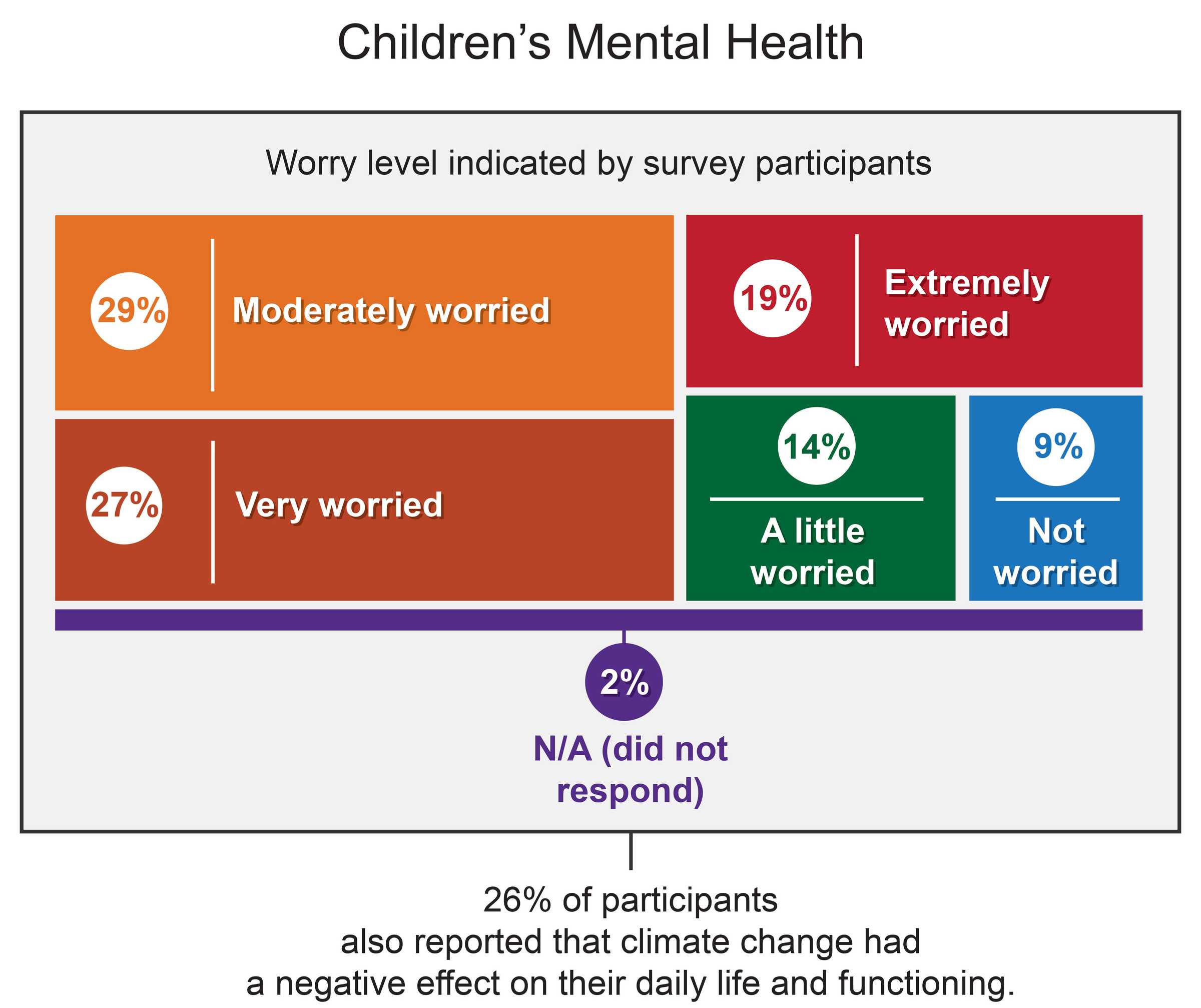Growing Climate Distress Among Children, Youth, and Young Adults
Climate change is directly and indirectly influencing mental health. Alongside high acute distress that people often experience as a result of climate disasters, broader climate distress can accumulate over time and increase the risk of mental health problems such as anxiety and depression. Climate distress may be described as a hidden stressor, as it is often not recognized or acknowledged by health care providers or society at large, which can lead to a lack of appropriate support and resources for individuals experiencing it, which can further exacerbate distress. While climate distress is not a clinical condition, some populations will experience new behavioral health conditions as well as exacerbations of existing conditions with ongoing distress from the changing climate. Climate-related distress is increasing, especially among children, youth, and young adults. Various estimates are available, but a recent study found that among 1,000 people aged 16–25 years in the U.S., 46% said they were “very” or “extremely” worried about climate change, and 26% of respondents indicated that their feelings about climate change negatively affected their daily life and functioning.

Figure: 26% of the 1,000 people aged 16–25 years surveyed for the recent study reported a negative effect on at least one of the following: eating, concentrating, work, school, sleeping, spending time in nature, playing, having fun, and relationships. Figure from NCA5’s Human Health chapter, based on data from this study.
National Park Service: Opportunities to Explore the Benefits of Outdoor Engagement on Youth Behavioral Health
In the face of growing climate distress among children, youth, and young adults, the National Park Service (NPS) presents potential opportunities for recovery and resilience. Every year, nearly 300 million people visit the more than 400 National Park sites across the nation to enjoy these natural and cultural treasures. In addition to the learning and recreational activities they provide, parks are a valuable health resource. Mounting scientific evidence shows how exposure to green space improves mental health and adolescent mental well-being can be improved through participation in outdoor activities. Engaging youth in nature-based activities has been found to impart a sense of hope and agency in facing major stressors of today’s world, including climate change. With a strong emphasis on youth engagement, the NPS has the potential for making an even greater impact on the health and wellbeing of this and future generations. Further research is needed to better understand nature-based interventions and the kinds of outdoor activities that enhance the mental well-being of adolescents. The NPS plays a crucial role in this arena, as a land management agency that provides a diverse array of structured programming for approximately 50,000 youth annually including recreational, educational, volunteer, and career development opportunities.
Figure. Youth engaging in the residential Youth Camping program in the summer of 2022 in Washington State. This NPS program combines education and job skills training with outdoor adventure for 16- to 18-year-olds. With the guidance of experienced field staff, youth crew members work on conservation, reforestation, and recreation projects, while developing leadership and teamwork skills. Participants earn money and potential high school credit while gaining job skills and professional references. Photo credit: Northwest Youth Corps.
It’s normal for extreme climate events as well as the existential threat of climate change to cause people to experience emotional distress. Feelings such as overwhelming anxiety, constant worrying, trouble sleeping, and other depression-like symptoms are common responses.
- If you are experiencing emotional distress related to any natural or human-caused disaster, call or text SAMSHA’s Disaster Distress Helpline at 1-800-985-5990 for free 24/7 crisis counseling for people. Deaf and hard of hearing ASL callers can use a videophone or ASL Now.
- If you or someone you know is struggling or in crisis for any reason, help is available: call or text 988 or check out SAMHSA’s 988 Suicide & Crisis Lifeline online.
- For younger kids, CDC provides printable Ready Wrigley activity books in English and Spanish on preparing for many climate hazards including extreme heat, hurricanes, and tornadoes, as well as coping after a disaster, flooding & mold, and mosquitoes. For older kids, check out CDC’s Helping Teens Cope After a Natural Disaster and Ready.gov’s Disaster Preparation Games.
- Learn about meditation and mindfulness from NIH’s National Center for Complementary and Integrative Health and practice mindfulness with the 5-part guided series of Mindfulness Tools from the Office of the Surgeon General designed to offer support during stressful times.
- Learn more about climate hazards and mental health from:
- SAMHSA’s Disaster Technical Assistance Center, including information on hurricanes and tropical storms, floods, wildfires, and tornadoes and severe storms;
- SAMHSA’s Disaster Behavioral Health Information Series Resource Center’s climate change-related resources;
- SAMHSA’s Climate Change and Health Equity webpage;
- SAMHSA’s Disaster Handbook for Behavioral Health Service Programs;
- ASPR TRACIE’s Disaster Behavioral Health Resources, which include information about services for at-risk populations following a disaster; and
- The Fifth National Climate Assessment, Human Health, Chapter 15, which includes discussion of mental health.
In addition to the federal resources listed, some non-governmental and other organizations work in the space of climate and mental health and may have helpful resources. Please note that views expressed are not necessarily those of HHS:
- The American Academy of Child & Adolescent Psychiatry (AACAP) Climate Change Resource Center
- American Psychological Association and ecoAmerica
- American Psychiatric Association
- Climate Mental Health Network
- Climate Psychology Alliance North America
- Connecting Climate Minds
- The All We Can Save Project
- Good Grief Network
- Climate Psychiatry Alliance
- Mental Health and Climate Change Alliance (MHCCA)
- International Transformation Resilience Coalition
- National Association of State Alcohol and Drug Abuse Directors, Policy Brief on Disasters and Substance Use
- World Health Organization Mental Health and Climate Change Policy Brief (2022)
- Intergovernmental Panel on Climate Change Chapter 7: Health, Wellbeing, and the Changing Structure of Communities
